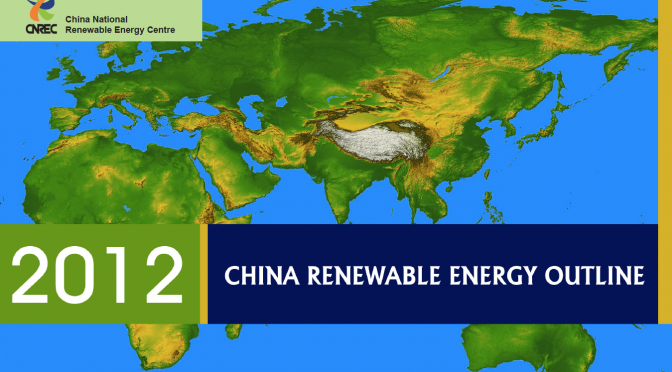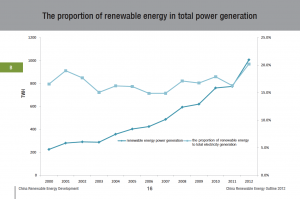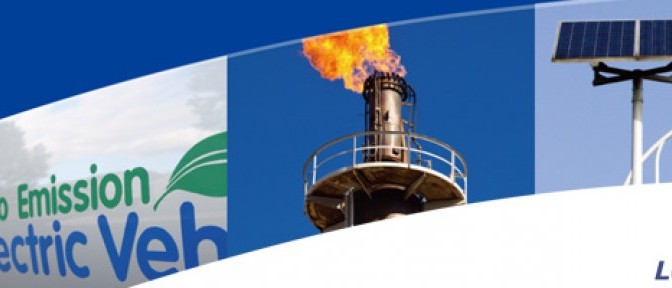Almost one year without new blog-posts. That’s kind of impressive in a not-so-positive way. But soon new things will happen. Check again in August 2015 for news.
Kaare


 Despite a impressive growth in the RE capacity in China, it has been difficult for renewable energy to gain a significant share of the total electricity production. For the period 2000 to 2010 the percentage has been closer to 15% than to 20% in most years, hardly keeping pace with the high growth rates in electricity consumption. However, in 2012 the share passed the 20% line and reached 20.2%, mainly due to and increase in hydro power and wind power.
Despite a impressive growth in the RE capacity in China, it has been difficult for renewable energy to gain a significant share of the total electricity production. For the period 2000 to 2010 the percentage has been closer to 15% than to 20% in most years, hardly keeping pace with the high growth rates in electricity consumption. However, in 2012 the share passed the 20% line and reached 20.2%, mainly due to and increase in hydro power and wind power.
A new publication from China National Renewable Energy Centre (CNREC) gives a good overview of the development of renewable energy in China from 2000 to 2012. Previous figures for capacity and production of hydro, wind, solar and biomass has been consolidated and revised in order to give the most accurate picture of the development. Furthermore, more information regarding investments and comparison with other countries and regions are brought up to date. Finally, the leaflet gives an overview of the Chinese RE policy and current RE targets. Download it from CNRECs web site.
At the annual meeting 13 to 15 November 2013 in the China Council for International Cooperation on Environment and Development (CCICED) a Task Force for China’s environmental protection and social development launched a summary report with 6 recommendations for how to ensure development of an “Ecological Civilisation”. This vision includes a harmonious society, sharing the fruits of development and safeguarding social justice and equity, but there is an urgent need to deepen the currently weak understanding of environmental and social relationships, and to identify priority fields for action in order to achieve this vision.
The task force operates with a framework for policymakers: 1) Awareness, 2) behaviour and participation, and 3) coordinated governance. The report points to the more soft topics in the necessary transformation of the Chinese society with focus on sustainability and environmental protection, and it sets up a model for how environmental behaviour, public environmental governance and environmental values can be coordinated and jointly developed.
The six recommendations from the Task Force starts with a recommendation on elaboration a vision of coordinated social, economic and environmental development for 2050 and development of a phased plan of policy and actions for the period to 2020. The recommendations also points to a number of activities within the next years to strengthen the long-term vision and the practical next-steps towards more environmental awareness, behaviour and governance. As example, the report suggest that the next five-year plan should be listed as the National Economic, Social and Environmental Development Plan, so that environmental policy and the associated planning will become a significant item in parallel with economic and social policies. Also and Environmental Impact Accessments (EIAs) should be introduced for major policies.
The Task Force comprises both Chinese and international experts, including high-level people from the Research Office of the State Council and from the Energy Research Institute under NDRC. It is definitely worth reading. Find the report at CCICED website.
In a remarkable clear report “China Energy Policy” the Energy Research Institute under NDRC (ERI) recommends much more focus on the energy demand side and on non-fossil energy supply. ERI recommends to strengthen in energy administration by increasing the National Energy Administration grow into an Energy Ministry taking more responsibility for the energy demand side from other ministries. Not only the energy intensity should be controlled but also the total energy consumption. And non-fossil fuels should have priority in the supply chain, reducing the current heavy dependency on coal and oil. Taxes and other financial policies should be the main driver for the future deployment of non-fossil fuels – basically renewables and nuclear power.
Stop expansion of long-distance transport of energy
Another interesting recommendation is to let import substitute long distance transport of coal and electricity from the North West China to the large energy consumers in the South East China. The idea that China should strive for coal self-sufficiency should be abandoned. Instead ERI suggest that the growth in energy consumption in the South East China should be covered by increased import of coal and LNG. Actually ERI finds that China by increasing the import of LNG could increase it’s pricing power. Last but not least ERI recommends that long-distance transport of electricity using Ultra High Voltage (UHV) transmission lines should be avoided due to the high cost and the increased risk for nation-wide power outages. The power supply of the South East coastal regions should be up to the the region itself. This recommendation is in sharp contrast to the current State Grid strategy where the UHV lines have an important role. Also the ERI recommendation could reduce the possibilities for obtaining a high share of renewables in China’s energy system as the resources of wind power and solar energy are focused in the North and North West of China. But nevertheless an interesting viewpoint worth further analyses in i.e. long term scenario analyses.
National and global conclusions and recommendations
“China Energy Policy” is a comprehensive analysis of the next five years development of the energy system in China, including 12 conclusions and 10 policy recommendations, covering both national and international topics. Very interesting reading for everyone interested in the Chinese viewpoint on national and global energy policy. The executive summary can be found on this link, and a hardcopy of the whole report can be purchased on the ERI web site.

When the 2012 Global Green Growth Forum (3GF) opens in Copenhagen on 8 October a high-level Chinese delegation lead by NEA viceminister Liu Qi will be among the participants, and China will formally be new partner in the cooperation, which include Denmark, the Republic of Korea and Mexico. Also Qatar and Kenya will be new partners.
The 3GF is an alliance focusing on international cooperation between government as private companies on a steady and rapid green growth. The 2012 Forum has “resource efficiency and growth as overarching theme with a number of different seminars during the two-day event. China has a special country session and will also be active in other seminars.
Find the agenda and more information about the 2012 3GF here. I will follow up after the forum in a new blog entry.

The EU China Trading Project EUCTP launched last October a Low Carbon Economy Platform and a web site, which gives assest to information about relevant events, documents and activities in the cooperation between EU an China.
Recently a new work program for the EUCTPs project on Low Carbon Economy was launched – focusing on a number of quite topical issues, like electricity market reforms, technical standards for integration of renewables, pricing and market regulation and access to the electricity markets in China and EU. Also activities regarding energy efficiency and demand side management are part of the work program as well as “smart cities” and emission trading systems. See the full overview of the work program here: Low_Carbon_Economy-Activity_Update_EUCTP_II.
This website will be dedicated to news and insight into the development of energy in China with focus on renewable energy. The audience will be Chinese and non-Chinese people within the energy sector with some kind of background knowledge about energy.
I will be adding posts one to two times every week.
Categories: Renewable Energy (Solar, biomass, wind, hydro, geothermal), Energy Policy, International, CNREC